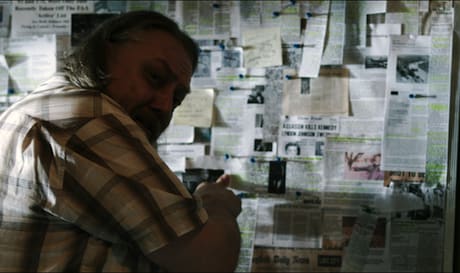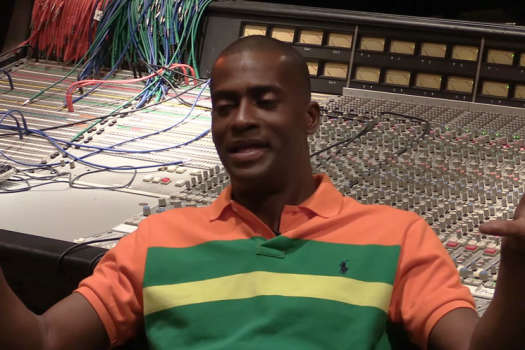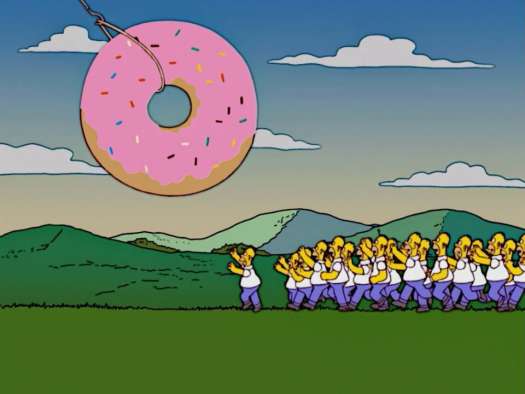One of the biggest limitations of the faux-documentary genre is its inability to capture anything emotional or transpose any sort of tonal interpretation onto the text. It's an easier style to manage, being inherently amateurish and implicitly explaining stylistic shifts and inconsistencies through its "found footage" template, but it's also exceedingly cold.
This is why it tends to work well in a visceral capacity, giving some element of "realness" to a horror movie or candidness to comedy, but in more cerebral, emotionally relevant works, it's a greater hindrance than virtue. Resultantly, Christopher MacBride's cleverly considered and culturally relevant play on global perception, The Conspiracy, is a mixed bag, having the unnerving sense of immediacy and actuality necessary to sell its thriller elements, but lacking a deeper secondary structure to ground the character arcs driving the core plot.
As framed, this politically contemptuous hyperbole follows two documentary filmmakers — Aaron (Aaron Poole) and Jim (James Gilbert), both using their real names to add a sense of legitimacy — making a film about a conspiracy theorist YouTube sensation. Initially, their documentation takes the usual sanctimonious tone, where the filmmakers feel inherently superior to their subject, but when the ramblings connecting global events to a larger New World Order start to make a bit of sense and their subject goes missing, the pair begin to question their flippancy.
Poole, ever the consummate actor, is actually quite convincing as someone prone to suggestion, gradually unraveling as a sceptic turned proponent of elaborate conspiracy theory. His interest in an underground group of global leaders controlling the cultural ethos, and resultantly horrific events like the 9/11 incidents, is believable more so via his performance than the inconsistent and occasionally ludicrous assemblage of fake documentary footage.
Similarly effective is the eventual climax, wherein Jim and Aaron attempt to infiltrate an elaborate boys club, to a less than desired outcome. The handheld, captured aesthetic gives it all some urgency, which helps compensate for the fact that the actual progression of the plot doesn't quite gel, or make a great deal of sense.
Ignoring the fact that the conspiratorial signifiers presented throughout are highly superficial, not even touching upon aspects like the economy as inspiration for constructed war, the biggest flaw is that, despite the best efforts of the actors, it's hard to care. Everything is presented in an expository, hollow manner, leaving the outcome, which relies, in part, on emotional engagement, to hold nothing but vague curiosity.
Within The Conspiracy are some great ideas and potential, but unfortunately, they're mostly unfulfilled.
(eOne)This is why it tends to work well in a visceral capacity, giving some element of "realness" to a horror movie or candidness to comedy, but in more cerebral, emotionally relevant works, it's a greater hindrance than virtue. Resultantly, Christopher MacBride's cleverly considered and culturally relevant play on global perception, The Conspiracy, is a mixed bag, having the unnerving sense of immediacy and actuality necessary to sell its thriller elements, but lacking a deeper secondary structure to ground the character arcs driving the core plot.
As framed, this politically contemptuous hyperbole follows two documentary filmmakers — Aaron (Aaron Poole) and Jim (James Gilbert), both using their real names to add a sense of legitimacy — making a film about a conspiracy theorist YouTube sensation. Initially, their documentation takes the usual sanctimonious tone, where the filmmakers feel inherently superior to their subject, but when the ramblings connecting global events to a larger New World Order start to make a bit of sense and their subject goes missing, the pair begin to question their flippancy.
Poole, ever the consummate actor, is actually quite convincing as someone prone to suggestion, gradually unraveling as a sceptic turned proponent of elaborate conspiracy theory. His interest in an underground group of global leaders controlling the cultural ethos, and resultantly horrific events like the 9/11 incidents, is believable more so via his performance than the inconsistent and occasionally ludicrous assemblage of fake documentary footage.
Similarly effective is the eventual climax, wherein Jim and Aaron attempt to infiltrate an elaborate boys club, to a less than desired outcome. The handheld, captured aesthetic gives it all some urgency, which helps compensate for the fact that the actual progression of the plot doesn't quite gel, or make a great deal of sense.
Ignoring the fact that the conspiratorial signifiers presented throughout are highly superficial, not even touching upon aspects like the economy as inspiration for constructed war, the biggest flaw is that, despite the best efforts of the actors, it's hard to care. Everything is presented in an expository, hollow manner, leaving the outcome, which relies, in part, on emotional engagement, to hold nothing but vague curiosity.
Within The Conspiracy are some great ideas and potential, but unfortunately, they're mostly unfulfilled.




